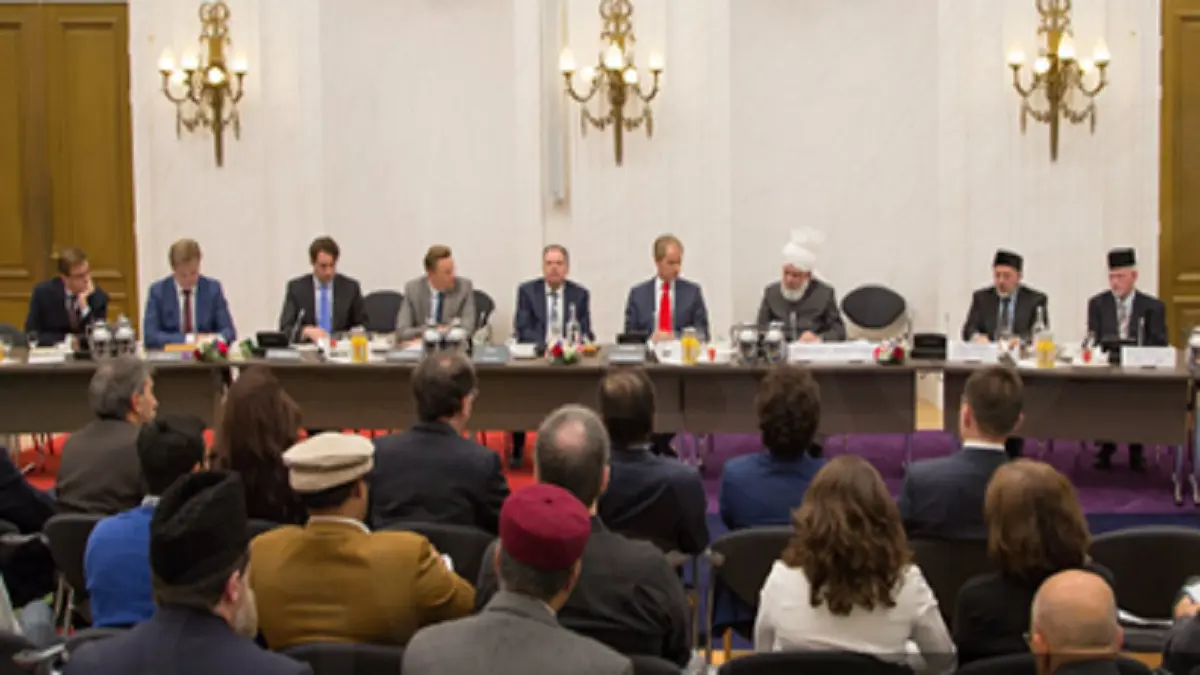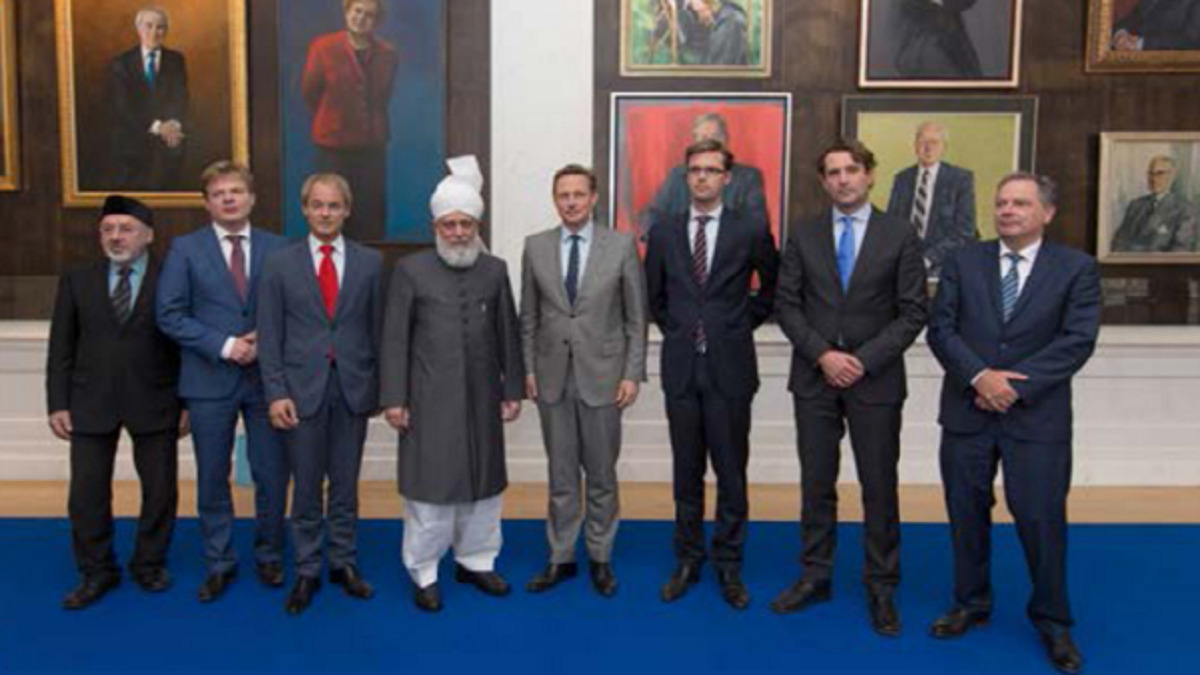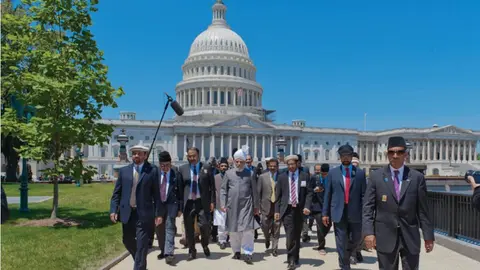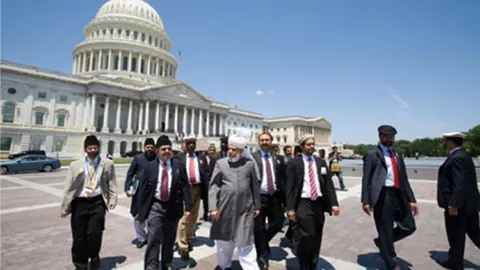World Peace and Security: The Critical Issues of Our Time (II)

[This is a continuation of the previous one: "WORLD PEACE AND SECURITY: The Critical Issues of Our Time (I)".
"As I have already mentioned, the common and basic accusation against Islam is that it is a religion that promotes extremism and war. However, nothing could be further from the truth. In chapter 2, verse 191, Al'lah has prescribed that a war can only be justified as a means of defence. This point is reiterated in chapter 22, verse 40, which states categorically that permission to fight is granted only to those who have been attacked and have been forced to fight. Moreover, the permission to fight that Al'lah the Almighty has granted to Muslim governments is only as an instrument to ensure religious freedom and freedom of faith. Therefore, in chapter 2, verse 194, Al'lah forbids Muslims to engage in any battle or war where religious freedom exists.
Therefore, no Muslim, group of Muslims or Muslim country has the right to engage in any kind of violence, war or lawlessness against any state or its people. Simply put, in Europe and the West, being secular governments, no Muslim possesses any right to violate the laws of the territory in question, violently oppose the government or instigate any kind of rebellion or insurgency. Indeed, according to the true teachings of Islam, if a person residing in a non-Muslim country feels that he does not enjoy genuine religious freedom, he should still not engage in dissent or lawlessness; rather, he should leave the country and emigrate to a place of more favourable conditions.
In chapter 16, verse 127, of the Holy Quran, it is prescribed to Muslim governments that if attacked they should respond proportionately and only as a measure of self-defence. The Quran thus clearly states that the punishment must be limited to, and proportionate to, the crime committed. In chapter 8, verse 62 of the Holy Quran, God says that if opponents harbour evil intentions and plan to cause prejudice, but then desist and take a step towards reconciliation, one should immediately accept their gesture and work towards a peaceful solution, whatever their motivation. This Quranic teaching is the key to the maintenance of international peace and security. In today's world, there are many examples of countries that have decided to develop very aggressive policies in response to perceived hostility from others. They seem to act on the principle: "It is better to destroy them before they destroy us". However, Islam prescribes that no opportunity for peace should be missed, and that one should try to establish peace even if the hope is remote.
In chapter 5 verse 9, God Almighty has declared that the enmity of a nation or people should only incite one to act justly and fairly. Islam teaches that in all circumstances, however complicated, the principles of justice and integrity must be firmly adhered to. Justice and fairness are therefore of paramount importance, even in a state of war, and once the war is over, the victorious party should continue to adopt justice, never resorting to excessive cruelty.
In today's world, however, we do not find such high moral standards and integrity. Rather, at the end of a war, countries impose sanctions and restrictions that limit the progress of the defeated parties and prevent such nations from achieving genuine freedom or independence. Such policies are damaging to international relations and can only lead to increased frustrations and have a negative impact. The truth is that it will not be possible to establish sustainable peace until justice is imposed at all levels of society.

Another important teaching of Islam, found in chapter 8, verse 68 of the Holy Quran, states that Muslims are not allowed to take any prisoner except in a state of war. Therefore, extremist and terrorist groups that are taking prisoners without justification are acting in total opposition to Islamic teachings. Moreover, according to some sources, they are not only taking prisoners, but are also inflicting the most barbaric cruelties on their victims. The acts being committed by these terrorist groups can only be condemned in the strongest terms. On the other hand, The Quran teaches that even if the prisoners were justifiably captured, it would be best to treat them favourably and release them whenever possible.
Chapter 49, verse 10 of the Holy Quran contains a golden principle for peacemaking, stating that if there is a dispute between nations or groups, a third party should mediate and bring about a peaceful resolution to the conflict. In the case of an agreement, if either side unjustly attempts to subjugate the other and contravenes the negotiated agreement, then the other nations must unite and use force if necessary to restrain the aggressor. However, once the aggressor has withdrawn, they should not suffer humiliation or undue restraint; rather, they should be allowed to move forward as a free nation and society. This principle is of great importance in today's world, especially with regard to great powers and international organisations such as the United Nations.
Regarding the establishment of world peace, Chapter 22, verse 41 of The Holy Quran contains a very important principle that guarantees universal religious freedom. The Quran says that if permission to fight had not been granted at that time, apart from mosques, churches, synagogues, temples and places of worship of all religions would have been in grave danger. Therefore, the use of force permitted by Almighty God was not only to defend Islam, but also to save the religion itself. Indeed, Islam guarantees freedom, free will and the protection of people of all religions. Islam protects the right of every person to follow his or her own path or belief.
I have narrated before you some excerpts from the Holy Quran, which are a means of fostering unity at all levels of society and in all parts of the world. These are the golden keys to peace, which the Holy Quran has given to the peoples of the world. These are the teachings that the Holy Prophet of Islam (pbuh) and his true companions fulfilled to perfection.
Finally, in conclusion, I would like to reiterate again that the world is in desperate need of peace and security. This is the urgent issue of our time. All nations and peoples must unite for the common good and unite their efforts to put an end to all forms of cruelty, persecution and injustice perpetrated in the name of religion or otherwise. This includes ridiculing any religion, an act that can provoke frustration and resentment, and, of course, it also includes the hateful activities of extremist groups that falsely justify their evil actions in the name of religion.
On the other hand, we must show sincerity towards all nations and try to help them, so that all nations can prosper and develop their potential. The jealousies and rivalries we are witnessing are the result of an unbridled appetite for wealth. In this regard, The Holy Quran has offered us a golden principle, indicating that one should not greedily covet the wealth of others. Through this teaching we will succeed in promoting world peace. The demands of justice must be met at all levels of society, so that every person, irrespective of creed, caste or colour, is able to get ahead with dignity and honour. Today it is observed that many developed countries have increased their investments in the most impoverished and developing nations. It is imperative that they act justly and try to help, and not just use their natural resources and cheap labour for their own national gains or for profit. They should reinvest most of the profits made in such countries and use the wealth to promote the development and prosperity of the local population.
If developed countries were to act in this way, the benefit would not be limited to the poorer nations, but would be mutual. Trust will increase and pent-up frustrations will be eliminated. The impression that rich countries care only about themselves and unfairly wish to take unfair advantage of the resources of the weak and poor will disappear. Moreover, it will contribute to the improvement of local economies, thus promoting the global economy and the financial state. It would certainly also contribute to establishing a sense of global community, compassion and humanity. And, above all, it would lay the foundation for true peace in the world. If we do not pay attention to this, the current state of world peace will lead to the outbreak of a disastrous world war, the repercussions of which will be felt for generations to come, something our progeny will not forgive.
With these words, I bid you farewell. May God bring about true peace in the world. Thank you very much.
(lpbD) - God's peace and blessings be upon him.
(lpd) - peace be upon him.



